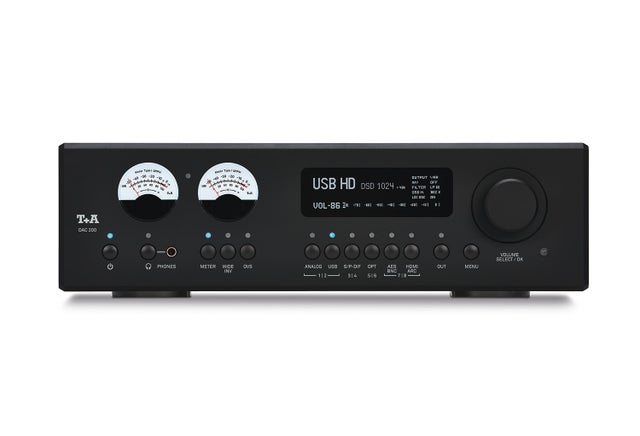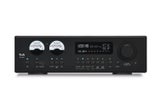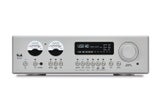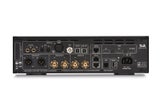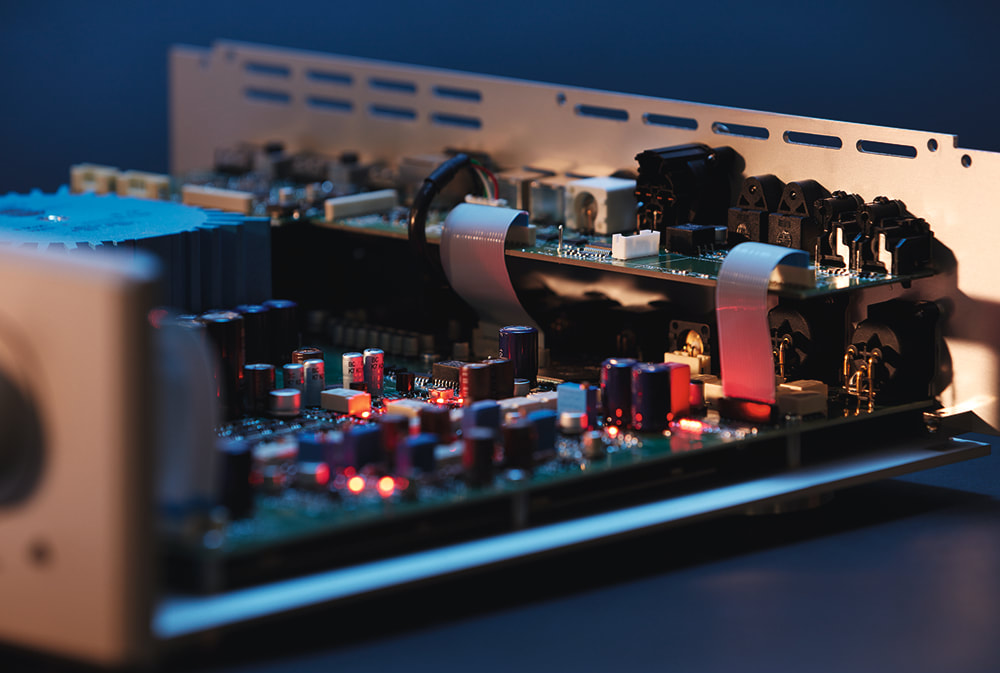- Amplifiers
- >
- Preamplifiers
- >
- T+A | DAC 200 - D/A Converter-Preamplifier
T+A | DAC 200 - D/A Converter-Preamplifier
SKU:
£5,800.00
£5,800.00
Unavailable
per item
The DAC 200 is the latest member of an extended family of High-End converters and pre-amplifiers. Every aspect of its design symbolises our uncompromising commitment to science and music. The ability to reproduce DSD 1024 files and its complete galvanic separation are just two highlights which underline the potential of the DAC 200 in impressive style. The DAC 200 is designed to convert a large number of digital formats into natural-sounding analogue signals, and to pass them on via the integral headphone or analogue outputs.
AVAILABLE TO ORDER | IN-STORE COLLECTION ONLY - Please contact us for information on stock availability and lead time before making a purchase
De-Jitter Masterclock
T+A's belief in totally pure music required an enormous effort on their part to eliminate the most minuscule of interfering influences. The T+A De-Jitter Masterclock was developed with the goal of freeing all T+A DACs from such interference signals, and in particular those which result from the use of computers. This type of interference – known as jitter – is caused by minimal timing errors, which still manage to exert a harmful influence on the sound experience unless they are removed before the conversion into analogue signals.
The De-Jitter Masterclock was developed here in Herford, and constitutes a consistent audiophile response to jitter: in a multi-stage process the incoming signals are examined, and even the largest of jitter artefacts are removed. In the first stage the incoming signal delivers a raw clock pulse which is analysed very closely by micro-processors: the signal is then switched to the Masterclock – but only if its frequency and stability fulfil strict minimum criteria. If those criteria are not met, the signals are cleaned again through a further PLL stage in a specially constructed second jitterbug; this process reduces the residual jitter by a factor of 4.
Signals which fulfil the purity requirements are de-coupled completely from the input jitter by switching to the Masterclock. They are then further processed by two high-precision quartz oscillators. Each oscillator is reserved for a single clock family; the Masterclock covers both the odd 44.1 kHz clock to 354.8 kHz as well as the even 48 kHz clock to 762 kHz.
The De-Jitter Masterclock was developed here in Herford, and constitutes a consistent audiophile response to jitter: in a multi-stage process the incoming signals are examined, and even the largest of jitter artefacts are removed. In the first stage the incoming signal delivers a raw clock pulse which is analysed very closely by micro-processors: the signal is then switched to the Masterclock – but only if its frequency and stability fulfil strict minimum criteria. If those criteria are not met, the signals are cleaned again through a further PLL stage in a specially constructed second jitterbug; this process reduces the residual jitter by a factor of 4.
Signals which fulfil the purity requirements are de-coupled completely from the input jitter by switching to the Masterclock. They are then further processed by two high-precision quartz oscillators. Each oscillator is reserved for a single clock family; the Masterclock covers both the odd 44.1 kHz clock to 354.8 kHz as well as the even 48 kHz clock to 762 kHz.
Path Separation TechnologyT+A believe in reproducing music in its purest form. And that is why they make every effort right at the development stage to eliminate even the most insignificant of interference factors, regardless of how minimal they are. Joint processing of PCM and DSD files in a single converter is just such a source of interference: supposedly insignificant, but in fact having a crucial influence on the sound. It was T+A's insistence on eliminating this particular influence that caused them to develop the unique T+A Path Separation Technology: both PCM and DSD have their own converter, specifically tailored to their requirements. These converters exclude adverse sound influences as well as exploiting the potential of each format to the full. For PCM signals T+A use their quadruple converter, whereas DSD files are processed using the T+A True 1-bit converter, which is unique in the world.
|
Converters &FiltersT+A's True 1-bit converter is unique, as it forms a break with a paradigm: conventional converters process DSD signals by converting them into PCM, and reproducing them using the PCM mode. But this conversion contradicts T+A's principles, and caused them to develop the True 1-bit converter, which processes DSD files in their native form, without detrimental conversion processes, and reproduces them in totally pure form as genuine 1 Bit Stream.
T+A's PCM Quadruple Converter features a double symmetrical circuit design comprising the eight 32-bit Burr-Brown converters, thereby providing above-average compensation for non-linearities in the sound, and reduces the already minimal background noise by a further 6 dB. This sophistication results in amazing dynamism and linearity combined with an equally amazing freedom from distortion. Although we believe in unadulterated music reproduction, the Bezier filters – another in-house development – in the quadruple converter can be exploited by the listener to fine-tune the sound characteristics to his individual taste. The application of polynomials results in perfect timing behaviour for each of the six available filters, two of which are NOS stages. |
Galvanic Separation DASSThe analogue sound quality is crucially determined by consistent separation between the digital and analogue sections. This separation, which we term the “Digital Analogue Separation System”, utilises ultra-fast digital isolators from Silicon Labs to provide galvanic separation between the analogue and digital sections. Since it is vital to maintain this separation through the entire signal chain, the mains sections for the analogue and digital signal paths are also completely separated galvanically.
|
inputs, Pre-amps & OutputsNo restrictions of any kind – this maxim was our guide in determining the DAC 200’s connections: its inputs are as universal as they are high in quality: the USB-B inputs are based on the new high-resolution Thesycon chip, which processes signals up to DSD 1024. AES/EBU and BNC are also present, as is SP/DIF in optical and coaxial forms. The T+A SYS Link completes the high-speed signal connection within the Series 200 via the SYS IN input. One analog input is installed as standard, but two stereo HDMI inputs are available as an option.
|
As a specialised pre-amplifier, the DAC 200 features a discreet Class A pre-amplifier section as well as double mono “State of the Art” outputstage, whilst also providing several outputs designed to cope with any requirement. Balanced XLR and unbalanced RCA outputs transfer the analogue signals to the output stages, while headphones are connected via a balanced 4.4mm Pentaconn headphone output, which draws its signal from a special high-performance headphone amplifier. In contrast to conventional chip solutions, this is of fully discreet construction, and is specially designed for the requirements of headphones. An HDMI output with Audio Return Channel (ARC) for HDMI signal pass-through is available on the optional HDMI board.
Specifications
|
Analogue section
Frequency response + 0 / − 3 dB 0,1 Hz – 200 kHz Signal / noise ratio 110/114 dB THD / Intermodulation < 0,001 % / < 0,001 % Channel separation > 108 dB Pre-amplifier outputs variable: High level (RCA) 0...2,5 Veff / 22 Ohms, balanced (XLR) 0...5,0 Veff / 22 Ohms fixed: High level (RCA) 2,5 Veff / 22 Ohms, balanced (XLR) 5,0 Veff / 22 Ohms discreetly designed Class A-HV-output stage in Double-Mono-Circuitry Volume control Gold contact relays controlled in 1 dB steps, - 90 dB to 0 dB Headphone output 4.4 mm Pentaconn, discreetly designed high performance output stage, Class A operation up to 200 mA, 6 Ohms output impedance Analogue inputs High level (RCA) 250 mVeff ... 4,5 Veff / 10 kOhms Digital inputs 1 x AES-EBU 32...192 kHz / 16-24 Bit S/P-DIF: 2 x Standard Coax, 2 x optical TOS-Link 32...192 kHz / 16-24 Bit and DoP DSD64 (0x05/0xFA Marker) 1 x BNC 32...192 kHz / 16-24 Bit 2 x USB DAC: Device-Mode 44,1 ... 768 kSps (PCM) and up to DSD1024*, supports asynchronous data transfer. *DSD 512 and DSD 1024 with Windows PC and appropriate driver installed or Linux PC with Kernel 4.4 or higher only. Supports DoP up to DSD 256 (0x05/0xFA Marker). 2 x HDMI IN, 1 x HDMI OUT with ARC (as an option) |
Supports DoP up to DSD 256 (0x05/0xFA Marker).
2 x HDMI IN, 1 x HDMI OUT with ARC (as an option) D/A converter section PCM Double-Differential-Quadruple-Converter with four 32-Bit Sigma-Delta D/A converter per channel, 705,6 / 768 kSps conversion rate DSD T+A-True-1Bit DSD D/A converter, up to DSD 1024 (49,2 MHz), native bitstream Upsampling T+A signal-processor – synchronous upsampling with four selectable oversampling algorithms. FIR short, FIR long, Bezier/IIR, Bezier, NOS (non-oversampling) Analogue filter Phase-linear Bessel filter 3rd order, switchable with 60 or 120 kHz cut of frequency Mains / Accessories / Dimensions Mains 200 – 240 V, 50 – 60 Hz, 30 Watts Standby < 0,5 Watts Dimensions (H × W× D) 10 × 32 × 34 cm, 4 x 12.6 x 13.4 inch Accessories Remote control FM200, power cord, USB cable Weight 6,2 kg, 13.7 lbs Finishes Alu silver anodized (43), Alu schwarz anodized (42) Technical modifications reserved |

